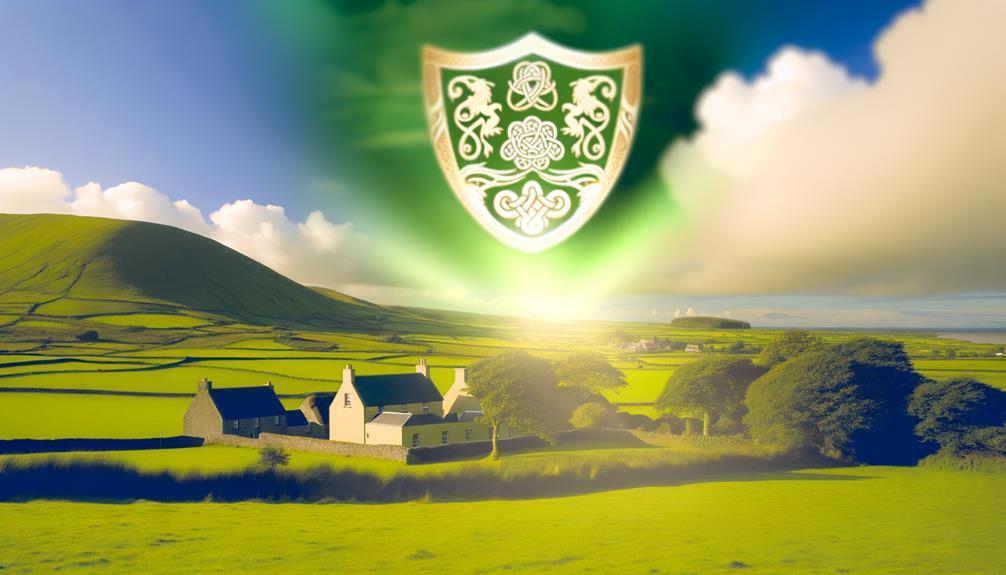Liam Name Meaning and Origin
The name Liam originates from the Germanic elements 'wil' (will or desire) and 'helm' (helmet or protection), initially forming the name Willahelm in early medieval Europe. It later became Wilhelm and was adapted into Old French as Guillaume.
In Irish, the name transformed into Uilliam and finally Liam. Historically, it embodies traits of strength and resolve.
Gaining modern popularity, figures like Liam Neeson and Liam Hemsworth have bolstered its appeal. The name Liam retains historical depth and cultural significance, hinting at a rich legacy of interconnected European linguistic evolution and societal values.
Continue to discover more intriguing facets.

Key Takeaways
- Liam originates from the Germanic elements 'wil' (will) and 'helm' (protection).
- It is derived from the Frankish name Willahelm, evolving through Old French as Guillaume.
- The name signifies strength, resolve, and protection, embodying the essence of a formidable protector.
- Liam has roots in Gaelic as Uilliam and gained popularity in English-speaking countries.
- It remains a top choice for boys' names, influenced by celebrities like Liam Neeson and Liam Hemsworth.
Etymology of Liam
The etymology of the name Liam traces its origins to the Germanic elements 'wil,' meaning 'will' or 'desire,' and 'helm,' meaning 'helmet' or 'protection,' which together form the Old High German name Wilhelm. The name Liam has been a popular choice in Ireland, possibly due to its similarity to the Gaelic name Uilliam. In Irish culture, the name Liam is often associated with strength and protection. Similarly, the meaning of the name Sean, another popular Irish name, traces back to the Gaelic name Seán, which is derived from the Hebrew name Yochanan, meaning “God is gracious.
This name was later adapted into the Old French as Guillaume, before making its way into English as William. Over time, the Irish adopted the name and it evolved into the shorter form, Liam, which maintained the original meaning of resolute protector.
The transformation from Wilhelm to Liam exemplifies the linguistic and cultural shifts that names undergo through centuries, reflecting the interchange between different languages and traditions. Liam, now a popular given name, carries with it a rich tapestry of historical connotations and linguistic heritage.
Historical Background
The name Liam has its roots in medieval Europe, originating as a shortened form of the Old High German name Willahelm, which later evolved into the English name William.
Over the centuries, Liam transformed and adapted to various linguistic and cultural contexts, maintaining its popularity across different regions.
Today, Liam holds significant cultural relevance, particularly in English-speaking countries, where it frequently ranks among the most popular names for boys.
Medieval European Roots
Emerging from the rich tapestry of medieval Europe, the name Liam traces its origins to the Old High German name Willahelm. It later evolved through various linguistic transformations. Willahelm itself is a compound of two elements: 'willio,' meaning 'will' or 'desire,' and 'helm,' meaning 'helmet' or 'protection.'
This name was introduced to various European regions through the migrations and conquests of Germanic tribes, subsequently adopted by the Normans. As these cultures intermingled, Willahelm found its way into Old French as Guillaume and ultimately into Old English as William.
The name Liam emerged as a diminutive form of Uilliam, the Irish adaptation of William, reflecting the deep-rooted interconnectedness of medieval European languages and cultures.
Evolution Over Centuries
Over the centuries, the name Liam has undergone significant metamorphoses, reflecting the dynamic linguistic and cultural shifts across Europe. Originating from the Old Germanic name Willahelm, meaning 'helmet of will,' it evolved through various forms including:
- Old High German: 'Willahelm' – emphasizing protection and resolve.
- Medieval Latin: 'Guillaume' – widely adopted in Frankish territories.
- Anglicization: 'William' – becoming prominent in English-speaking regions.
The shift from Willahelm to Liam encapsulates the interplay between language and identity.
As cultures intermingled, the name adapted to linguistic norms and regional pronunciations, ultimately resulting in the modern, concise form 'Liam.'
This name's evolution highlights the historical processes of simplification and localization within the context of European languages.
Cultural Significance Today
Tracing its roots back to ancient Germanic tribes, the name Liam today carries a rich cultural significance that transcends its humble origins.
Originally derived from the Old Germanic name Willahelm, meaning 'resolute protector,' Liam has journeyed through various cultures, especially Irish, where it became a popular moniker.
In contemporary times, Liam has gained widespread acclaim, particularly in English-speaking countries. Its popularity surged in the late 20th and early 21st centuries, partly due to its adoption by celebrities and public figures.
This widespread acceptance has cemented Liam not only as a common given name but also as a symbol of timeless strength and resilience, resonating with parents seeking a name with historical depth and modern appeal.
Irish Roots
Liam, a name of Gaelic origin, traces its roots to the Irish form of the name Uilliam, a derivative of the Frankish Willahelm.
Historically significant, it was borne by numerous notable figures throughout Ireland's storied past, contributing to its widespread cultural influence.
The name embodies strength and resolve, deeply embedded within the rich tapestry of Irish heritage.
Gaelic Name Origin
Rooted deeply in the rich tapestry of Irish heritage, the name Liam is derived from the Old Irish name 'Uilliam,' which itself is a form of the Frankish name 'Willahelm,' meaning 'resolute protector.' This etymological journey underscores the Gaelic roots of the name, reflecting a profound cultural lineage. The change from 'Uilliam' to 'Liam' showcases a common linguistic evolution in Irish names, often characterized by:
- Simplification: Over time, longer names were shortened for ease of use.
- Phonetic Shifts: Alterations in pronunciation contributed to the modern form.
- Cultural Integration: The name became increasingly popular due to its strong, protective connotations.
Such linguistic adjustments illustrate the dynamic nature of Gaelic name origins.
Historical Significance
The historical significance of the name Liam in Irish culture is deeply intertwined with the nation's medieval history and its legendary figures. Originating from the Old Irish name Uilliam, Liam is a derivative of the Germanic name Wilhelm, meaning 'resolute protector.'
Historically, the name was borne by numerous Irish nobles and warriors, symbolizing strength and leadership. During the Middle Ages, the name gained prominence due to its association with William the Conqueror, whose Norman invasion of Ireland left a lasting impact on Gaelic society.
Moreover, the name Liam has been immortalized in Irish literature and folklore, often representing heroic characters who embody the virtues of bravery and steadfastness. This deep-rooted historical connection underscores its enduring popularity in Ireland.
Cultural Influence
In Irish culture, the name Liam carries significant cultural influence, deeply embedded in the nation's traditions, language, and artistic expressions. Originating from the Old Irish name Uilliam, Liam is a shortened form of the name William, which means 'resolute protector.' Its usage has been widespread in Ireland, holding historical and cultural weight.
The name Liam is notable for several reasons:
- Historical Figures: Many prominent Irish leaders and historical figures have borne the name.
- Literature and Arts: It frequently appears in Irish literature, reflecting the country's rich storytelling tradition.
- Modern Popularity: Liam has become one of the most popular names in contemporary Ireland, symbolizing a connection to heritage.
This name encapsulates the essence of Irish identity and resilience.
Frankish Influence
Frankish influence on the name Liam can be traced back to the Germanic elements that merged during the early medieval period, particularly through the introduction of the name Willahelm, which later evolved into William.
The Frankish Empire, instrumental in shaping medieval Europe, saw the amalgamation of various Germanic tribes. 'Willahelm' combines the elements “wil” (will or desire) and “helm” (helmet or protection), embodying a warrior ethos. As Frankish culture spread, so did their names, which were assimilated into various languages and dialects.
Over centuries, Willahelm was anglicized to William, which in turn was shortened to Liam in the Irish context. This transformation signifies the enduring legacy of Frankish nomenclature in modern names.
Meaning of Liam
Emerging from its Frankish roots, the name Liam carries the profound meaning of 'strong-willed warrior' or 'protector,' reflecting its historical derivation from the Germanic elements 'wil' and 'helm.' This etymology underscores the resilience and leadership qualities historically associated with the name.
The name 'Liam' has evolved considerably over the centuries, yet its core attributes remain:
- 'Wil' denotes willpower or determination, indicating a person's inner strength.
- 'Helm' translates to helmet or protection, suggesting a defensive prowess.
- Combined, these elements encapsulate the essence of a formidable protector.
Such historical depth in meaning reveals why 'Liam' continues to resonate across cultures, embodying a timeless legacy of strength and guardianship.
Medieval Significance
Rooted in the annals of medieval Europe, the name Liam was often bestowed upon individuals who exhibited unwavering determination and valor, reflective of the era's emphasis on martial prowess and feudal loyalty. Derived from the Germanic elements 'wil,' meaning will or desire, and 'helm,' meaning helmet or protection, Liam was a name that conveyed both leadership and fortitude.
During the Middle Ages, names carried significant weight, often signaling one's social standing or familial heritage. Liam, as a derivative of William, symbolized a protector or steadfast guardian, qualities highly valued in a time characterized by territorial conflicts and knightly duties.
Hence, the name Liam encapsulated the virtues essential for survival and honor in the medieval societal structure.
Modern Popularity
In contemporary times, the name Liam has surged in popularity, becoming a ubiquitous choice for newborns across various cultures and continents. This trend can be attributed to several factors:
- Celebrity Influence: Prominent figures, such as actor Liam Neeson, have brought the name into the public eye.
- Linguistic Appeal: The name's short, easily pronounced structure makes it appealing in multilingual contexts.
- Statistical Rise: According to the U.S. Social Security Administration, Liam has consistently ranked as one of the top names for boys since the early 2010s.
Historically rooted yet modernly resonant, Liam's ascension in the global naming charts underscores its enduring charm and adaptability, marking it as a contemporary favorite among parents worldwide.
Cultural Impact
The cultural impact of the name Liam is evident through its integration into various forms of media, literature, and even folklore, reflecting a deep-seated resonance in global consciousness.
Historically rooted in Irish culture, Liam has traversed geographical boundaries, becoming a ubiquitous presence in contemporary narratives. In literature, it often embodies characters of strength and integrity, while in folklore, it conjures images of heroism and valor.
The name's simplicity and strong phonetic appeal have made it a popular choice for fictional protagonists, further embedding it in collective memory. Additionally, its adaptation across different languages and cultures signifies its universal appeal, strengthening its cultural footprint and ensuring its enduring legacy in modern storytelling and naming traditions.
Famous Liams
Among the numerous individuals who have brought prominence to the name, actor Liam Neeson stands out as a significant figure in both film and cultural history. Known for his commanding presence, Neeson has portrayed a wide array of characters, from the heroic Oskar Schindler in 'Schindler's List' to the action-driven Bryan Mills in the 'Taken' series. His impact extends beyond film, cementing the name Liam in popular culture.
Other notable Liams include:
- Liam Hemsworth: An actor celebrated for his roles in the 'Hunger Games' series.
- Liam Gallagher: The iconic frontman of the British rock band Oasis.
- Liam Payne: A member of the globally successful boy band One Direction.
These figures have contributed to the name's enduring appeal and recognition.
Conclusion
In summation, the name Liam encapsulates a rich tapestry of linguistic evolution and cultural intersections. From its etymological roots in the Irish 'Uilliam' to the Frankish heritage evident in 'Willahelm,' it signifies valiant protector and unwavering guardian.
Throughout medieval times to contemporary society, Liam has burgeoned in popularity, leaving an indelible impact across various cultures. The legacy of notable individuals bearing this name continues to inspire, serving as a confirmation to its enduring allure and profound resonance.






